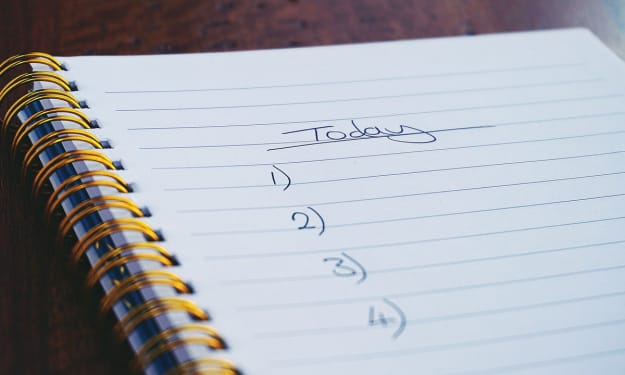Do You Have to Get Up Early to Get Ahead?
Confessions of a (Formerly) Unapologetic Night Owl

NO, I groaned internally, rolling over as my cell phone alarm beeped incessantly. That was my first thought, every morning. Just NO. A heartfelt rejection, with all my being, of the idea of being awake, getting up, and starting the day. Why had I committed to this folly of setting an alarm? Being on a schedule? What was I thinking?
For most of my life, I gloried in being a night owl. It was part of my identity as a creator, a bit rebellious, way cooler than being one of those go-getter early-risers. For years, I was able to work jobs that supported this lifestyle, where I worked, between the hours of 11:00 and 9:00, so I could get up at my leisure and have time to exercise and run errands before work, and time to write or socialize after. It wasn’t bad, although my schedule was always sporadic. I liked not being pinned to one tyrannical schedule. I was happy to say I didn’t set an alarm.
But by the end of last year, I was working full-time as a self-employed book coach, writer, and adjunct faculty, and I had to set some boundaries. I began to realize my late morning starts were sabotaging my life. I was getting up later and later, and soon I wasn’t doing any work until the afternoon. I stopped feeling well-rested and instead felt groggy and listless.
Some of this might be attributable to external things – mom passing, major job shifting and the ensuing economic uncertainty, political chaos, social unrest, the stress of dealing with the coronavirus pandemic – but as the days slipped away, my night owl ways started to feel less fun. In bed in the mornings, with no place to go and no appointments, I lay there and stewed over the past, present, and future, imagining all sorts of catastrophic scenarios. By the time I actually got up, sluggish and depressed, I rarely felt like tackling anything on my to-do list. All this was not helped by the fact that a good night’s sleep itself became almost impossible to achieve. I found it hard to get to sleep, and hard to stay asleep. Some of this was hormonal (yay, perimenopause!) some of it no doubt due to my inconsistent schedule.
So one of my goals for the new year has been to be consistent, for the first time in my life, with bedtimes and rising times. Numerous scientific studies tell us this is a good idea, to feel happier, more productive, and less stressed. Sleep is, apparently, the holy grail of health. Of course, I knew it was important, but up to now it was never something to worry about. I generally slept well, and if I didn’t, I was able to snatch that crucial extra hour in the morning to offset late nights or middle-of-the-night waking.
And of course, plenty of anecdotal evidence tells us that the most successful people are the early risers, no matter how I’d defended my late-start schedule and pooh-poohed the idea that you had to get up early.
The Trials
It was hard at first. What time should I get up? What time did I need to go to bed so I would feel rested enough to want to get up at that time? My sleep schedule had always been tied to the amount of available natural light. Thus, I naturally woke up earlier in the summer than in the winter. Now I was aiming for a consistent time no matter what.
Trial #1:
I started with an 8:00 rising time, using my cell phone as an alarm. (Full confession: I normally woke up at 9:00 or later, sometimes not getting up until 10:00 or <gulp> 11:00.)
Verdict: Nope. See the beginning of this article. I hated being awoken suddenly, and there was no compelling reason for me to get out of bed just because the alarm went off. I might wake up earlier, but I’m not getting up earlier.
Trial #2:
Getting one of those super-shrill old-fashioned alarm clocks, and putting it across the room so I have to get up to shut it off.
Verdict: It does get me up, but too often I slam it off then head straight back to bed. I’m too tired to want to do anything else. But I am finding that I need to wake up even earlier to get things done, so now what?
Trial #3:
I used to exercise first thing. Lately I’ve been interested in getting back into journaling on a regular basis, so I move exercise after coffee and journaling. Better. The lure of coffee alone is tempting enough to get me more interested in getting out of bed.
Verdict: Still feeling very grumpy about it though. Not able to be consistent.
Trial #4:
Use a light alarm. I set this at 7:00, a half hour before I want to start meditating at 7:30. It comes on with a soft glow that slowly brightens, then culminates in a whooshing, rhythmic (albeit mechanical) sound of ocean waves. I’ve picked this sound over other possibilities, as being the least objectionable. About a half-hour after that, the loud alarm rings across the room. I have that space in which to meditate. I am also more consistent with getting to bed around 11:00 pm, although I need to work on this.
Verdict: It’s actually easier to get up than it used to be. The light helps me gradually adjust to the fact it’s morning. Because I know the super-loud monster will be torturing my ears at 8:00, I’m prompted to wake up and start meditating so I won’t be interrupted. It also becomes a rule that I cannot go back to bed afterward. I am almost at the door anyway; it’s just as easy to keep going.
Miracle Morning?
Shortly after I began this ritual, I discovered Hal Elrod’s The Miracle Morning. He espouses a very similar morning routine to mine, the SAVERS:
Silence (meditation)
Affirmations
Visualization
Exercise
Reading
Scribing (journaling)
He says that doing each of these for 10 minutes a day, or an hour of your morning, can be life-changing. He has thousands of people on Facebook who swear by the method, and just reading the book will make you excited to try it if you’re not already fore-fronting your personal development at the beginning of your day. He makes an excellent point that these practices, and the discipline to do them consistently, prepare your conscious and subconscious mind for growth and learning throughout your day. They focus your mind on what you need to do that day to be successful. And that is what success is all about: the slow daily accumulation of habits and actions that move the needle forward on your goals.
As I was already meditating, journaling, and exercising, I decided to try the other three as well. (I was also reading, but in the evening, so I added a slot for the morning as well). My original three still take up the majority of my time (20-30 minutes each) but I also add in 5-10 minutes for the new additions.
Yes, my morning routine takes more like two hours, but as long as I get up early enough to fit it in before I start working, it’s fine.
So, how am I doing after the first month?
You’d think the idea of such a prolonged morning routine would be de-motivating, but so far I’m finding my energy levels have risen, and I don’t even think about how many hours I’ve slept (or not). It wasn’t easy; for the first few days to a week the first item on my gratitude list in my journal was “coffee!” since I struggled to make my zombie-brain function.
The more I do it, however, the easier it becomes. I’m even sleeping better, only waking up once or twice.
The weird thing is, I’m also waking up earlier on my own. By now I’ve usually finished meditating by 7:00, and am out of bed well before the loud alarm goes off (now set for 7:30). I’m aiming to push it back to 6:00. This is more likely as the sun rises earlier and earlier.
However, I also have to watch my bedtime. It’s still too easy for me to go to bed past midnight. I’m trying for a consistent 11:00 pm, because even though Hal Elrod swears that the energy you feel is only in your mind, despite the amount of sleep you get, my body is not convinced. I agree that telling yourself you have no energy and can’t possibly get up and will only drag your way through the day is self-defeating; I also know that I need a good 7-8 hours of sleep or I will feel it, sooner or later. Can I be productive and have energy longer than I thought, despite getting up several hours earlier? Yes, but my energy is not infinite. I work long days – my latest teaching day ends at 9:30 pm – so I schedule breaks as needed. I’m even trying to keep consistent with my schedule on weekends, to avoid energy fluctuations.
It’s a work in progress. For the first time, I am trying this whole getting-up-early thing, something lots of experts recommend, and it does get easier the more I do it. However, I know myself and that I rarely stick to one schedule for long. I will remain open and flexible to changing things around as needed, and see how it goes. I do know that I am getting so much more done during the day, and accomplishing more helps me feel better, physically and mentally. That feeling of accomplishment in turn helps motivate me to do more.
The verdict? I’m sticking with it, for now. The point is, even if, like me, you've always proudly considered yourself a night owl, you can change your body clock. If you find you are not as productive as you'd like to be, try focusing not on the getting up, but on motivating and inspiring behaviors that will energize you and help you win the day.
About the Creator
Jana Van der Veer
Book and mindset coach for writers. Book lover, chocoholic. Go to www.setyourmuseonfire.com to grab your copy of 10 Questions to Ask to Get Unstuck at Any Stage of the Writing Process!






Comments
There are no comments for this story
Be the first to respond and start the conversation.